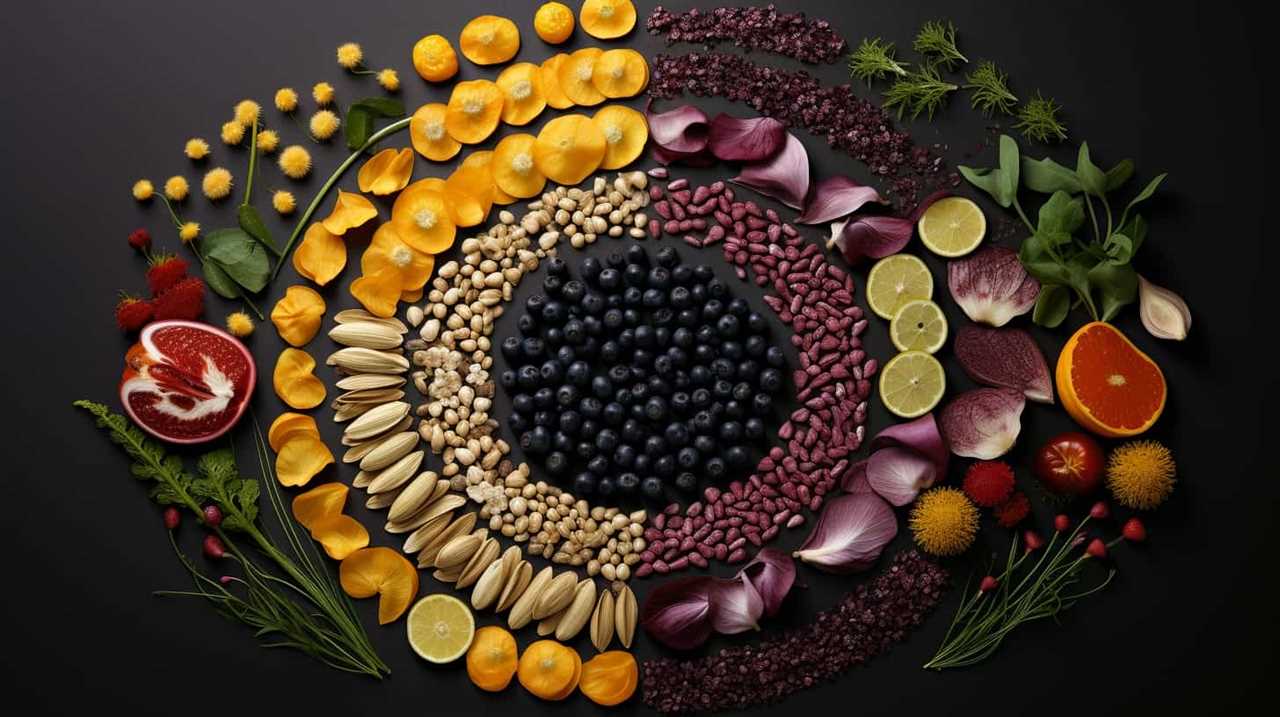
We have discovered a secret to ancient health benefits – tiny chia seeds! These small wonders, once a staple in Mayan and Aztec diets, offer many advantages that could transform your health.
From boosting energy and endurance to promoting mental clarity and focus, these power seeds are a nutrient powerhouse. They enhance skin health, strengthen bones and joints, and even provide sustained stamina and hydration.
Get ready to harness the incredible power of these ancient seeds for a healthier, happier you.
Key Takeaways
- Power seeds, such as chia and amaranth seeds, have been recognized by ancient civilizations like the Mayans and Aztecs for their nutritional and medicinal benefits.
- Power seeds are packed with essential nutrients like omega-3 fatty acids, fiber, protein, and antioxidants, making them a nutritional powerhouse.
- Incorporating power seeds into our diets can provide sustained energy, support digestive health, promote cardiovascular well-being, and boost the immune system.
- Power seeds offer numerous health benefits, including regulating blood sugar levels, reducing inflammation, supporting joint health, aiding in weight management, and promoting healthy skin and brain function.
Ancient Mayans and Aztecs
We discovered that the Ancient Mayans and Aztecs were avid consumers of these power seeds. These indigenous civilizations, known for their advanced agricultural practices, recognized the nutritional and medicinal benefits of these tiny seeds. The Ancient Mayans and Aztecs incorporated these power seeds into their diets and traditional medicine.

In the Ancient Mayan civilization, chia seeds were highly valued for their ability to provide sustained energy. They believed that consuming chia seeds before battle or long journeys would enhance their stamina and endurance. Chia seeds were also used medicinally to treat digestive issues and promote overall well-being.
Similarly, the Aztecs relied on the power of amaranth seeds for their nutritional value and healing properties. Amaranth seeds were a staple in their diets, providing a rich source of protein, fiber, and essential nutrients. The Aztecs also used amaranth seeds in traditional medicine to alleviate symptoms of various ailments, including digestive disorders and skin conditions.
The Ancient Mayans and Aztecs’ recognition of the traditional medicinal uses of these power seeds demonstrates their deep understanding of the natural world and their commitment to maintaining optimal health. Today, we can learn from their wisdom and incorporate these ancient power seeds into our own diets for their numerous health benefits.
Staple of Mesoamerican Diets
Let’s talk about the incredible role that these tiny power seeds played in the diets of the Mesoamerican civilizations.

These seeds weren’t only a staple food source for the Mayans and Aztecs, but they were also highly regarded for their nutritional benefits and culinary versatility.
With a rich history dating back centuries, these power seeds have now gained the status of a modern superfood, captivating the attention of health-conscious individuals around the world.
Nutritional Powerhouse of Mesoamerica
How did chia seeds become a nutritional powerhouse and staple in Mesoamerican diets?
The answer lies in the ancient cultivation techniques and traditional Mesoamerican recipes that have been passed down through generations.

Chia seeds were highly valued by the ancient civilizations of the Aztecs and Mayans for their incredible nutritional benefits. These tiny seeds are packed with omega-3 fatty acids, fiber, protein, and various vitamins and minerals. They provide sustained energy, aid digestion, and promote healthy skin and hair.
Chia seeds were often used in traditional Mesoamerican recipes such as chia fresca, a refreshing drink made by soaking the seeds in water or fruit juice.
Today, chia seeds continue to be an important part of Mesoamerican diets and are recognized worldwide for their nutritional power.
Indigenous Culinary Treasure
Chia seeds are an essential component of Mesoamerican diets, providing us with a rich source of nutrients and serving as an indigenous culinary treasure. These tiny power seeds hold great significance in the culinary traditions of the indigenous peoples of Mesoamerica.
Here are three reasons why chia seeds are considered an invaluable part of their cultural heritage:
- Cultural significance: Chia seeds have been cultivated and consumed by Mesoamerican civilizations for thousands of years. They were highly valued for their nutritional properties and were even used as offerings in religious ceremonies.
- Versatility in cooking: Chia seeds can be incorporated into a wide variety of dishes, adding a nutty flavor and a pleasant crunch. They can be used in baking, added to smoothies, sprinkled on salads, or used as a thickening agent for soups and sauces.
- Nutritional powerhouse: Chia seeds are packed with essential nutrients such as omega-3 fatty acids, fiber, protein, and antioxidants. They provide sustained energy, promote digestive health, and support cardiovascular well-being.
With their deep-rooted culinary traditions and cultural significance, chia seeds continue to be celebrated as an indigenous culinary treasure. As we explore the modern superfood with history, we’ll delve into the many health benefits these tiny power seeds have to offer.
Modern Superfood With History
Chia seeds have been a part of Mesoamerican diets for centuries due to their incredible nutritional profile and versatility. These tiny power seeds were cultivated using ancient techniques that have been passed down through generations. The Aztecs and Mayans recognized the health benefits of chia seeds and used them as a source of sustainable energy during long journeys and battles.
Nowadays, chia seeds are hailed as a modern superfood because they’re packed with essential nutrients like omega-3 fatty acids, fiber, protein, and antioxidants. They can be added to smoothies, yogurt, or oatmeal, or used as an egg substitute in baking. Incorporating chia seeds into our diets allows us to benefit from the wisdom of ancient civilizations while enjoying their delicious and nutritious potential.
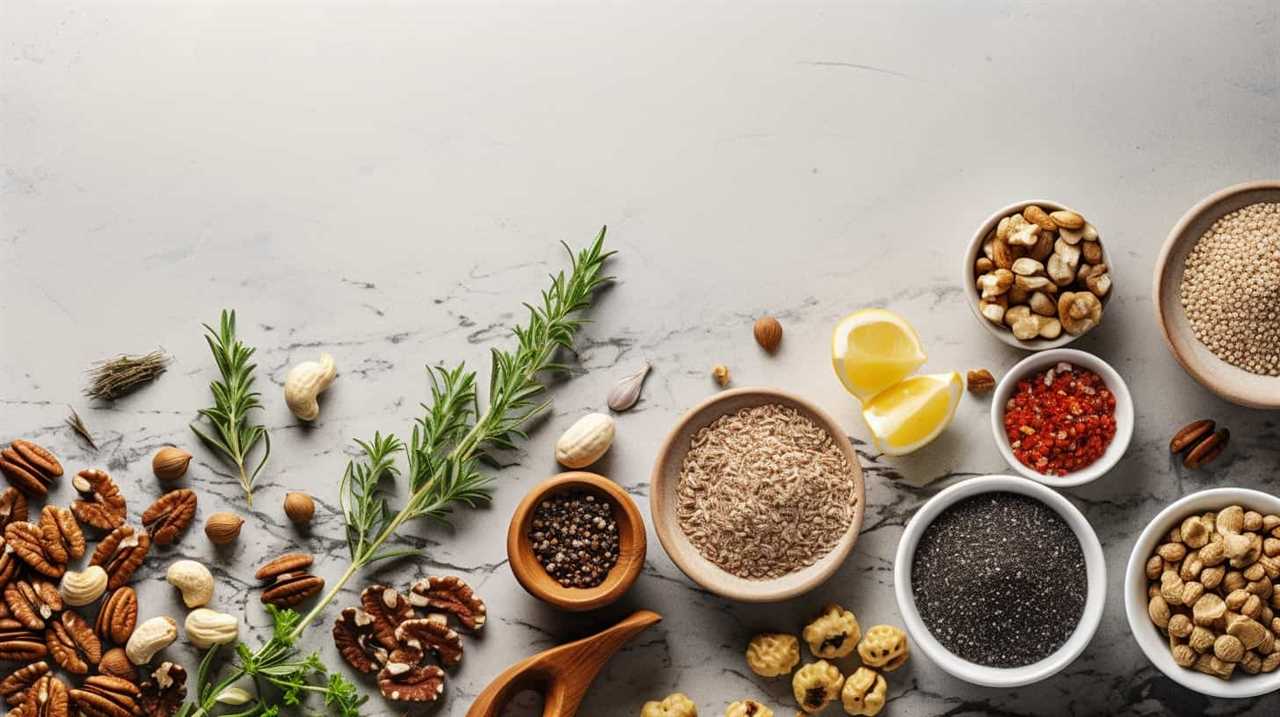
Energy and Endurance Boost
When it comes to boosting energy and endurance, power seeds have a lot to offer.
These tiny seeds have been found to naturally enhance stamina and increase physical endurance.
Packed with essential nutrients and antioxidants, power seeds provide energy-boosting benefits that can help us stay active and energized throughout the day.
Natural Stamina Enhancer
For centuries, humans have relied on the ancient power of tiny seeds to naturally enhance our stamina, giving us an energy and endurance boost. These natural energy boosters have been used by ancient civilizations to increase their physical and mental performance.
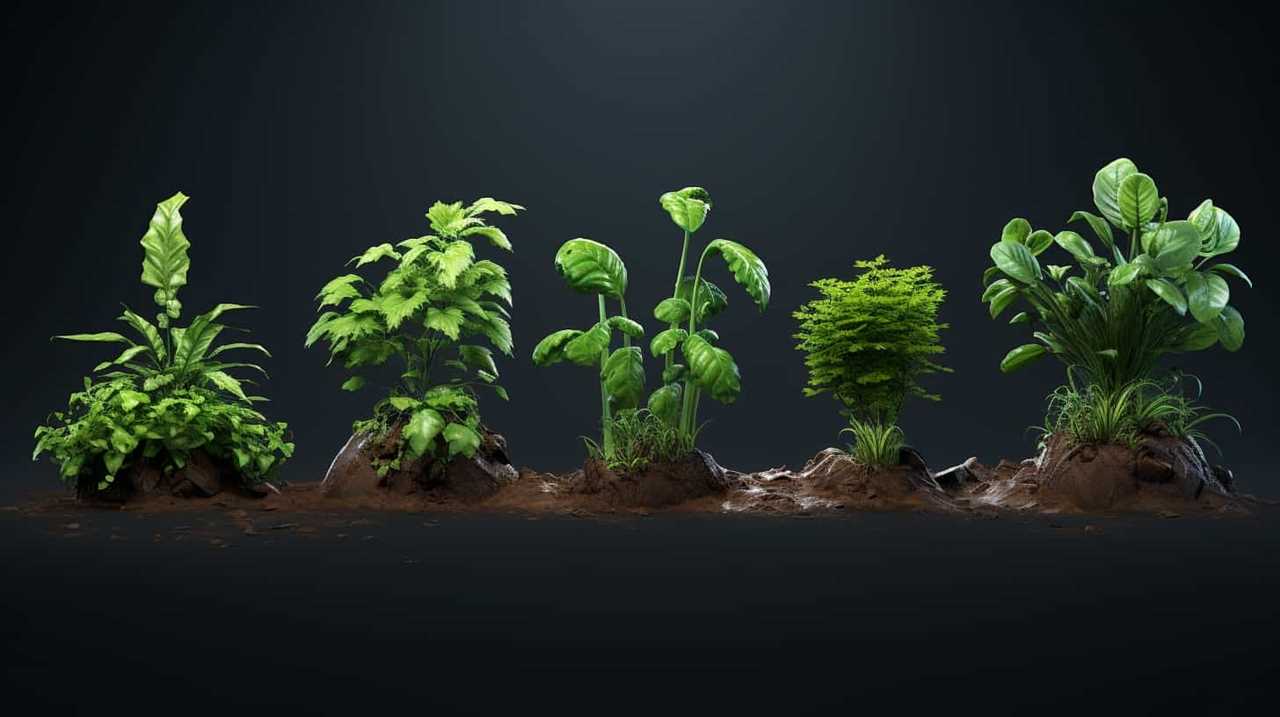
Here are three ancient endurance secrets that can help you become a powerhouse of energy and vitality:
- Chia Seeds: These small but mighty seeds are packed with nutrients like omega-3 fatty acids, fiber, and antioxidants. They provide a slow release of energy, keeping you fueled throughout the day and improving your endurance during physical activities.
- Flaxseeds: Rich in fiber and healthy fats, flaxseeds are known to boost energy levels and improve stamina. They also contain lignans, which have been linked to lower levels of fatigue and increased endurance.
- Pumpkin Seeds: These tiny powerhouses are a great source of protein, healthy fats, and minerals like magnesium and iron. They can provide sustained energy and improve endurance, making them an excellent natural stamina enhancer.
Increased Physical Endurance
We often rely on the power of tiny seeds to boost our energy and endurance, allowing us to push through physical challenges and reach new levels of performance.
When it comes to increased stamina and improved physical performance, these small power seeds can make a significant difference. Research has shown that certain seeds, such as chia seeds and hemp seeds, are rich in essential nutrients like protein, omega-3 fatty acids, and antioxidants.
These nutrients provide the body with sustained energy and help to reduce inflammation, allowing us to perform at our best for longer periods. Additionally, the high fiber content in these seeds promotes digestion and helps maintain stable blood sugar levels, preventing energy crashes during exercise.
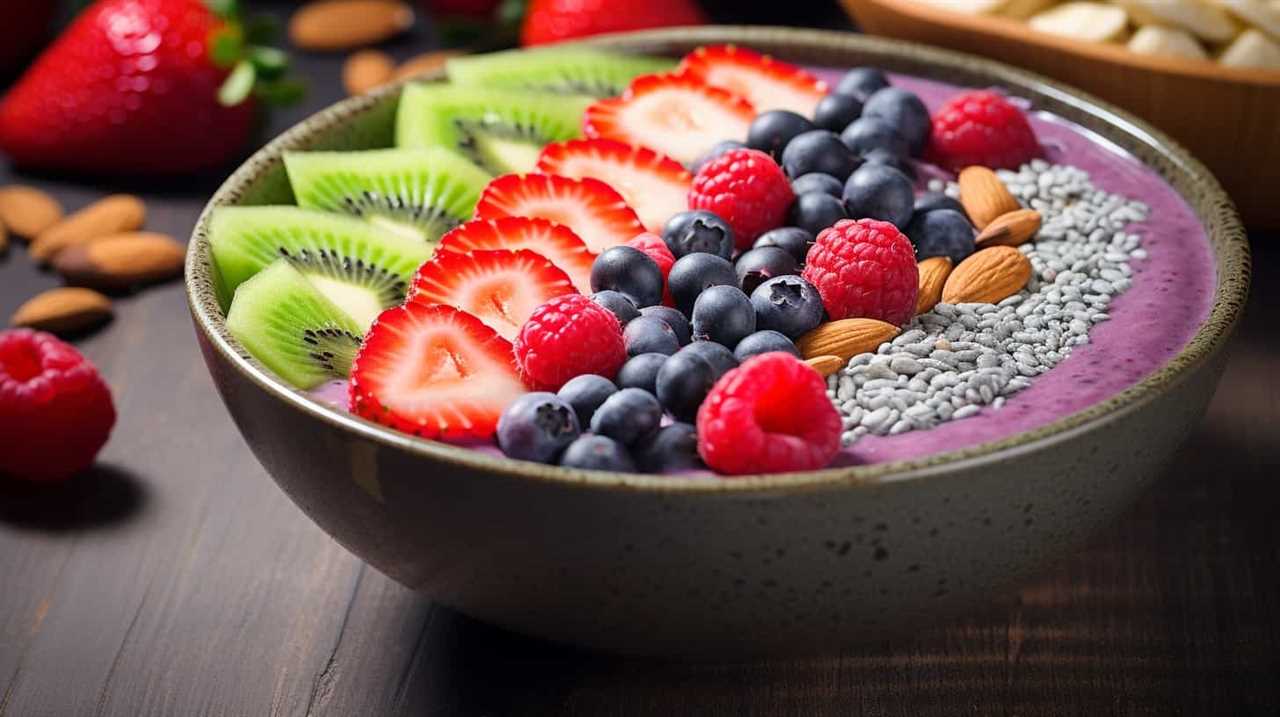
Including these tiny power seeds in our diet can provide the energy and endurance boost we need to excel in our physical endeavors.
Energy-Boosting Benefits of Seeds
To continue exploring the energy-boosting benefits of seeds and their impact on endurance, it’s important to highlight their role in providing sustained energy and reducing inflammation. Seeds aren’t only a great source of essential nutrients, but they also offer increased alertness and an immune system boost. Here are three key ways seeds can enhance your energy levels and overall well-being:
- Rich in nutrients: Seeds are packed with vitamins, minerals, and antioxidants that help fuel your body and promote optimal functioning. These nutrients provide a steady release of energy, keeping you alert and focused throughout the day.
- Omega-3 fatty acids: Many seeds, such as flaxseeds and chia seeds, are rich in omega-3 fatty acids. These healthy fats have been shown to reduce inflammation in the body, helping to boost energy levels and enhance endurance.
- Fiber content: Seeds are an excellent source of dietary fiber, which helps regulate blood sugar levels and prevent energy crashes. By stabilizing your blood sugar, seeds can provide a sustained release of energy, keeping you energized and focused for longer periods.
Incorporating a variety of seeds into your diet can provide numerous energy-boosting benefits, including increased alertness and an immune system boost. So go ahead and sprinkle some seeds on your yogurt, salads, or smoothies for an extra energy kick throughout the day.
Hydration and Sustained Stamina
With the help of these tiny power seeds, our bodies can maintain hydration and sustain stamina through the intake of essential nutrients.
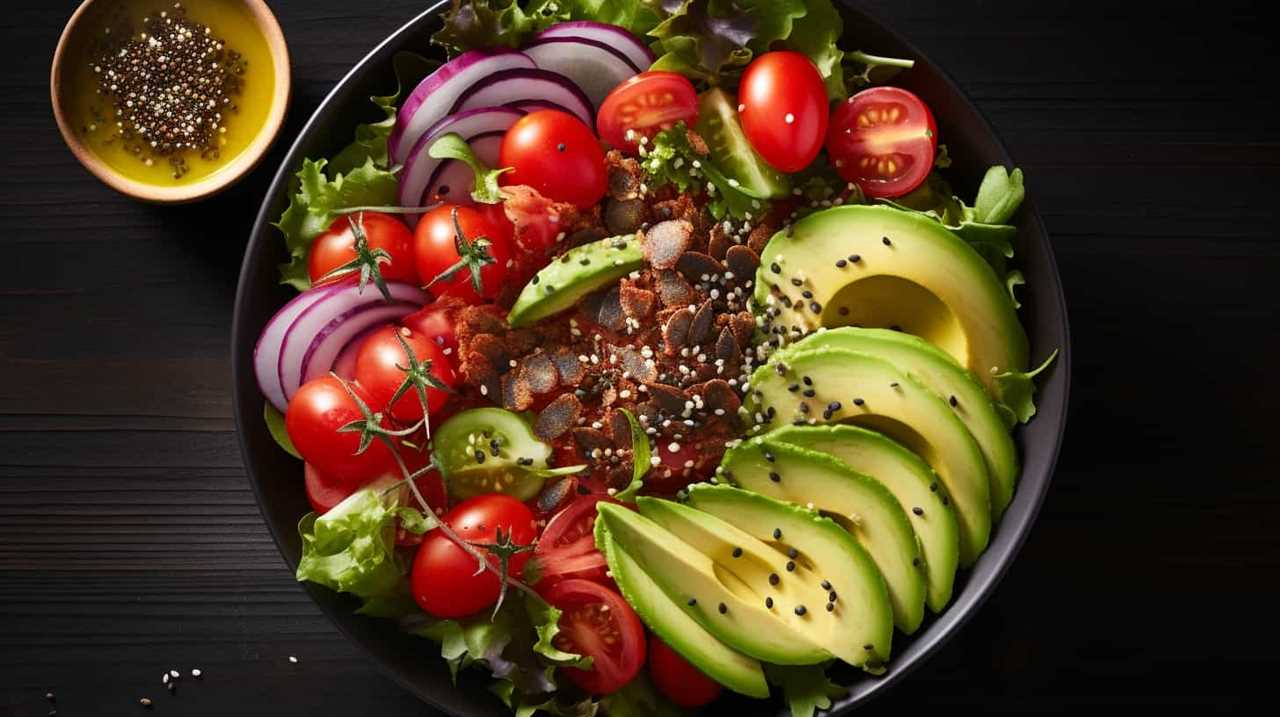
Hydration is crucial for our overall health and well-being, as it helps regulate body temperature, aids in digestion, and supports organ function. One effective hydration technique is to consume foods that are high in water content, such as fruits and vegetables.
Power seeds, like chia seeds and flaxseeds, are excellent sources of hydration as they can absorb water and release it slowly during digestion. Additionally, these seeds provide sustainable energy due to their high fiber and protein content.
This sustained stamina is essential for maintaining focus and productivity throughout the day. By incorporating tiny power seeds into our diet, we can ensure proper hydration and enjoy long-lasting energy to support our daily activities.
Nutrient Powerhouse
When it comes to nutrition, these tiny power seeds pack a serious punch. Chock full of essential nutrients, they offer a wide range of health benefits.
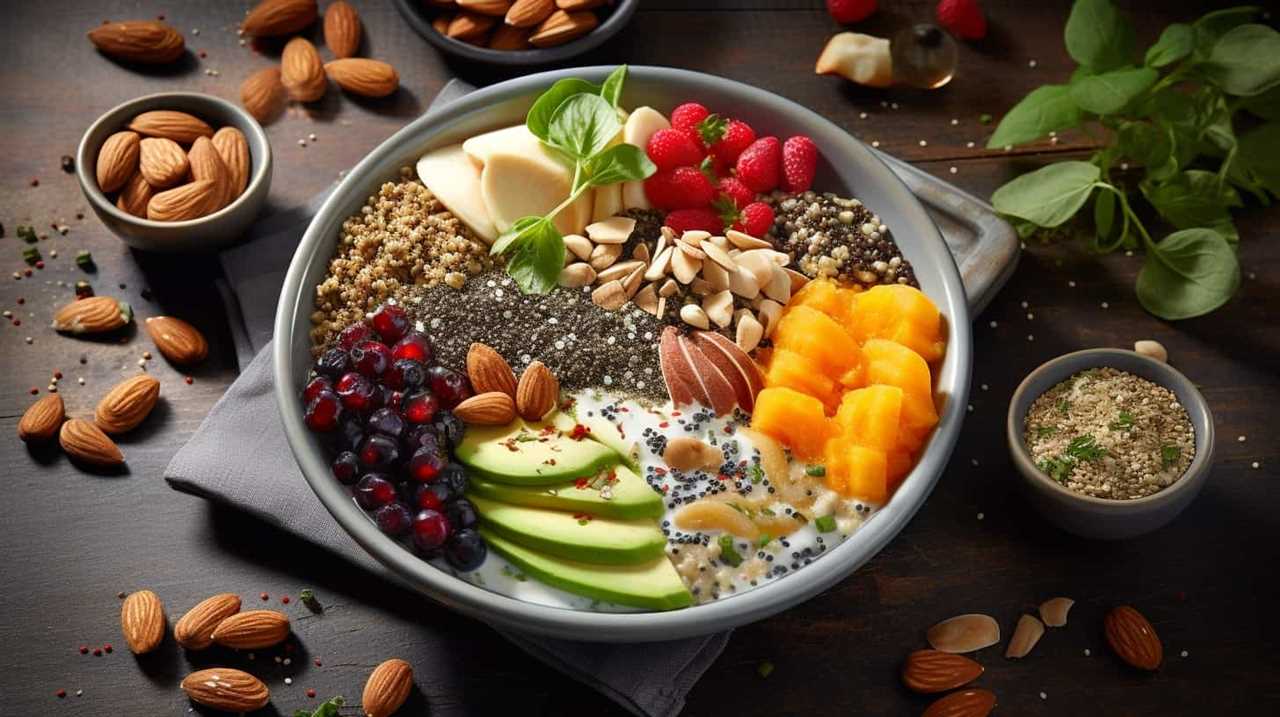
From providing a rich source of omega-3 fatty acids to delivering a hefty dose of fiber and protein, these nutrient powerhouses are a valuable addition to any diet.
Essential Nutrient Profile
Our bodies require essential nutrients for optimal health and functioning. When it comes to power seeds, they aren’t only rich in macronutrients like protein and healthy fats, but they also offer an impressive array of essential micronutrients. Here are three key nutrients that make power seeds a true nutrient powerhouse:
- Fiber: Power seeds such as chia seeds, flaxseeds, and hemp seeds are packed with fiber. This nutrient is essential for maintaining a healthy digestive system and regulating blood sugar levels. Additionally, fiber promotes satiety and can aid in weight management.
- Omega-3 Fatty Acids: These tiny power seeds are a great source of omega-3 fatty acids, particularly alpha-linolenic acid (ALA). Omega-3 fatty acids have been shown to have anti-inflammatory properties and can support heart health.
- Antioxidants: Power seeds are rich in antioxidants, which play a crucial role in protecting our cells from damage caused by harmful molecules called free radicals. These antioxidants, such as lignans, flavonoids, and phenolic compounds, have phytonutrient benefits and can support our immune system.
Health Benefits Explained
Incorporating power seeds into our diet allows us to harness the health benefits of these nutrient powerhouses. These tiny seeds have been cultivated using ancient techniques and have been valued for their medicinal properties for centuries.
One of the main health benefits of power seeds is their rich nutrient profile. They’re packed with essential vitamins, minerals, and antioxidants that support overall health and well-being. Power seeds are also a great source of dietary fiber, which aids in digestion and helps maintain a healthy weight.
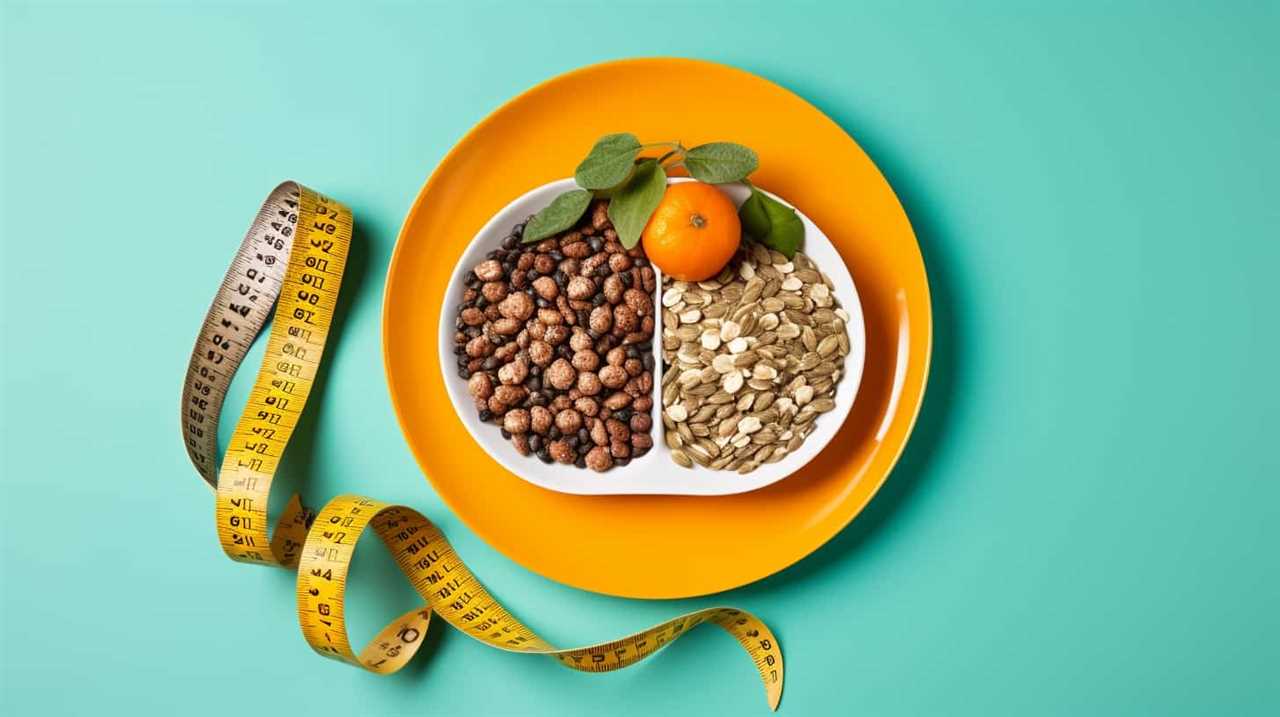
Moreover, these seeds have been used in traditional medicine to treat various ailments, such as inflammation, digestive disorders, and cardiovascular diseases. By including power seeds in our diet, we can benefit from their ancient cultivation techniques and tap into their traditional medicinal uses.
Digestive Health Support
One of the key benefits of incorporating power seeds into our diet is their ability to provide digestive health support. Power seeds, such as chia seeds, flaxseeds, and hemp seeds, are rich in fiber, which plays a crucial role in promoting gut health improvement and optimizing the digestive system.
Here are three reasons why power seeds are great for our digestive health:
- Fiber-rich content: Power seeds are an excellent source of dietary fiber, which adds bulk to our stool and helps prevent constipation. This promotes regular bowel movements and keeps our digestive system functioning smoothly.
- Prebiotic properties: Power seeds contain prebiotic fibers that act as food for the beneficial bacteria in our gut. These bacteria help break down food, absorb nutrients, and support overall digestive health.
- Anti-inflammatory effects: Power seeds contain omega-3 fatty acids, which have anti-inflammatory properties. Inflammation in the digestive system can lead to various digestive disorders, and consuming power seeds can help reduce this inflammation and promote a healthy gut.
Blood Sugar Regulation
To regulate blood sugar levels, power seeds offer numerous health benefits.
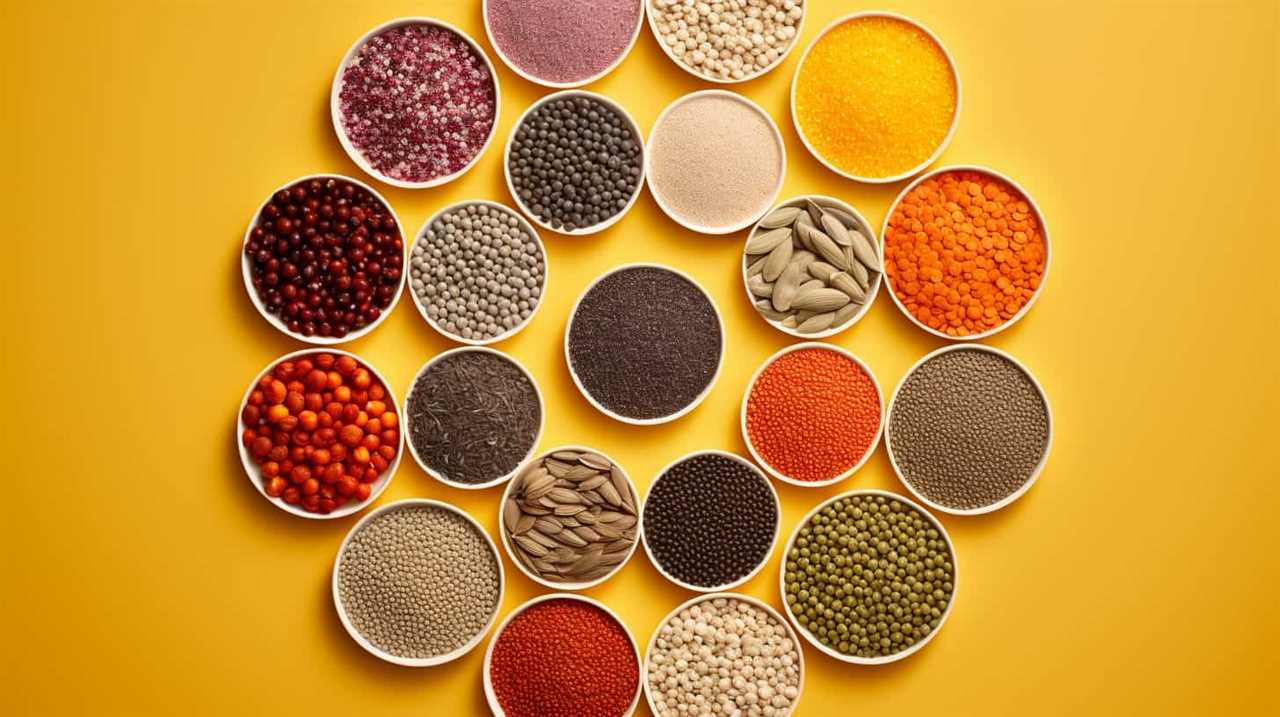
Ancient health practices have long recognized the importance of maintaining stable blood sugar levels for overall well-being.
Power seeds such as chia seeds, flaxseeds, and hemp seeds have been shown to be effective in helping to regulate blood sugar levels.
These tiny seeds are rich in fiber, which slows down the absorption of glucose into the bloodstream, preventing sudden spikes in blood sugar levels.
Additionally, power seeds contain healthy fats and proteins that further contribute to blood sugar regulation.
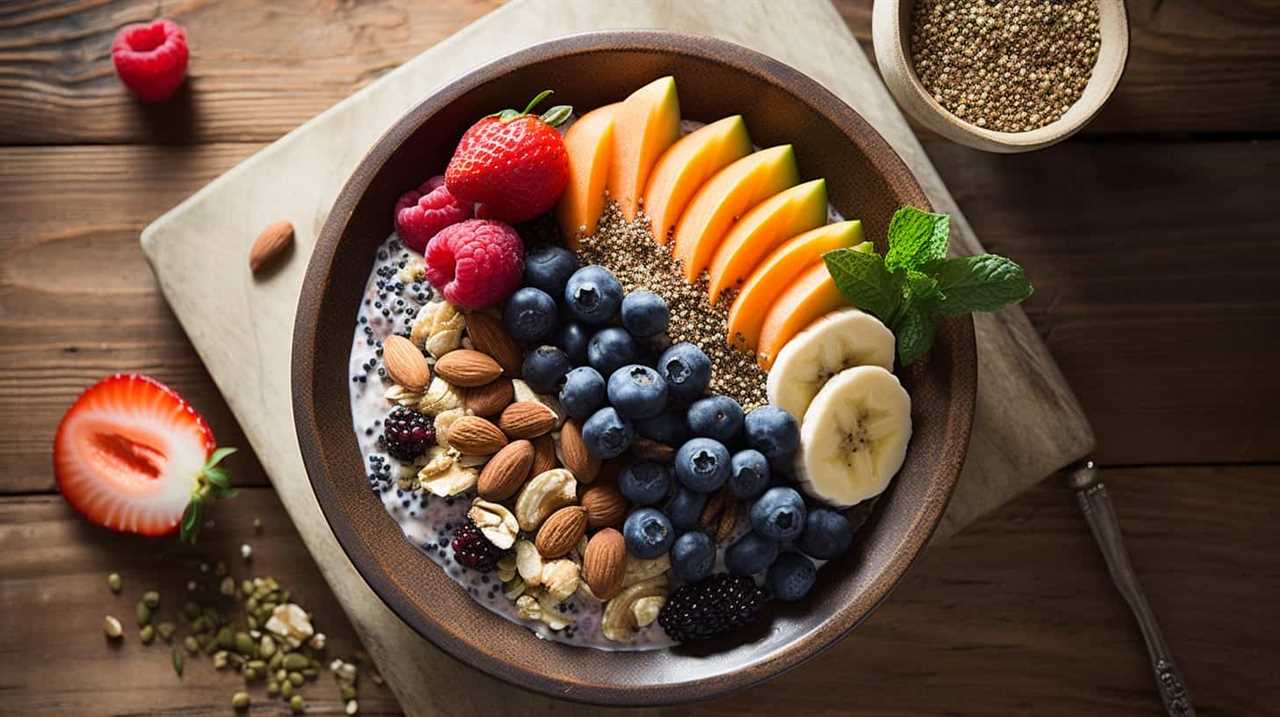
Studies have shown that incorporating power seeds into your diet can help improve insulin sensitivity and reduce the risk of developing type 2 diabetes.
Heart-Healthy Omega-3 Fatty Acids
We can reap the heart-healthy benefits of omega-3 fatty acids by including power seeds rich in these essential nutrients in our diet. These tiny seeds are packed with omega-3 fatty acids, which have been shown to promote heart health and reduce the risk of heart disease.
Here are three reasons why power seeds are excellent sources of heart-healthy omega-3 fatty acids:
- Omega-3 fatty acids help reduce inflammation in the body, which is a major contributor to heart disease.
- Consuming omega-3 fatty acids from power seeds can help lower blood pressure and improve overall cardiovascular health.
- Power seeds are a great addition to heart-healthy recipes, such as salads, smoothies, and baked goods, providing a delicious and nutritious way to incorporate these essential nutrients into our diet.
Anti-Inflammatory Properties
When it comes to anti-inflammatory properties, tiny power seeds have a lot to offer.
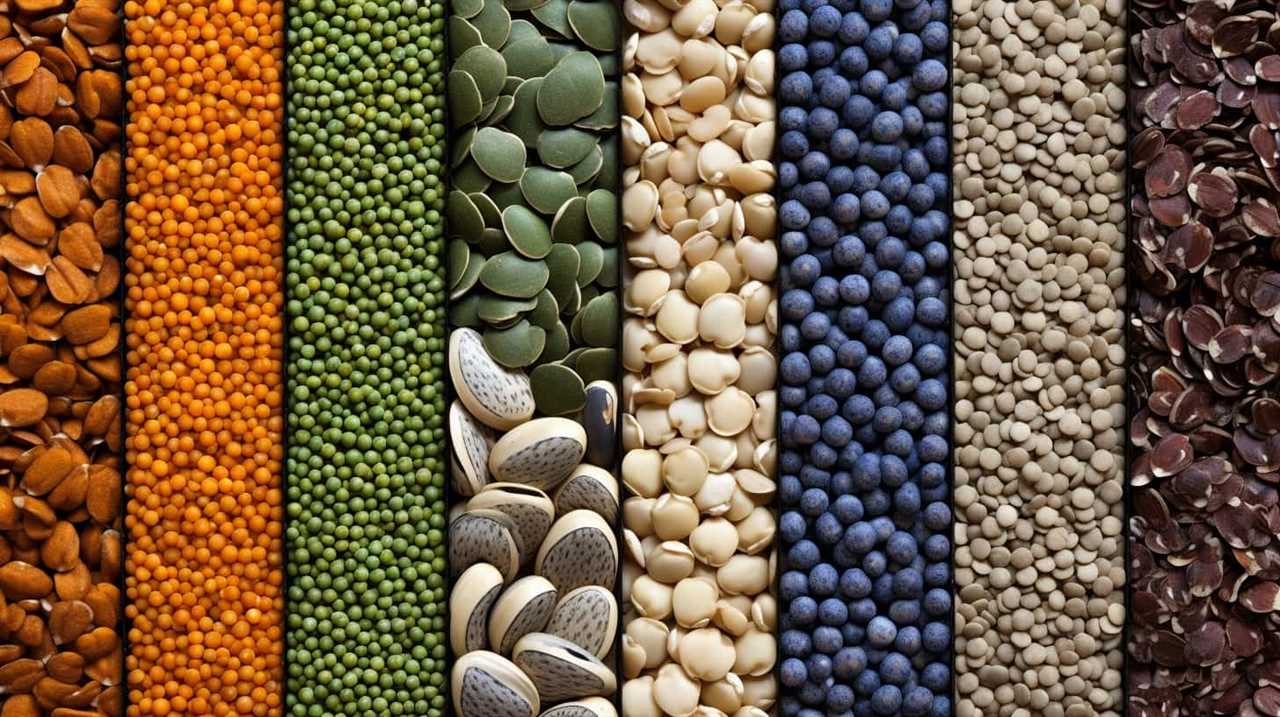
Not only can they provide pain relief benefits, but they can also support joint health by reducing inflammation.
Additionally, these seeds have disease prevention properties, helping to lower the risk of chronic inflammatory conditions.
Pain Relief Benefits
With their anti-inflammatory properties, tiny power seeds offer us an ancient remedy for pain relief. These natural remedies have been used for centuries to alleviate joint pain and provide relief from various types of discomfort. Here are three reasons why power seeds are beneficial in relieving pain:
- Reduction of inflammation: Power seeds contain compounds that help reduce inflammation in the body. This can be particularly helpful for individuals suffering from joint pain, as inflammation is a common cause of discomfort in the joints.
- Antioxidant properties: Power seeds are rich in antioxidants, which can help protect the body’s cells from damage caused by free radicals. By reducing oxidative stress, these seeds may contribute to pain relief and overall well-being.
- Nutrient content: Power seeds are packed with essential nutrients, such as omega-3 fatty acids and vitamins, that support the body’s natural healing processes. These nutrients can play a role in reducing pain and promoting optimal health.
Incorporating power seeds into your diet can be a simple and effective way to find natural relief from pain.
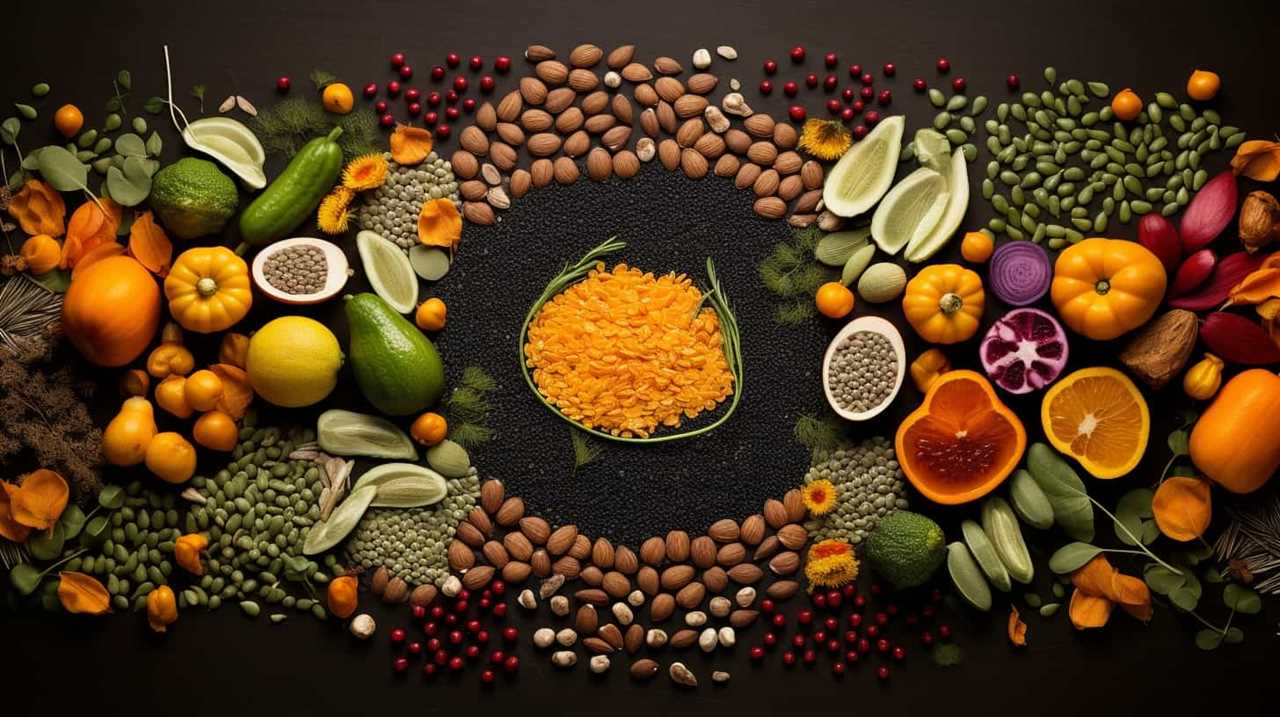
Joint Health Support
To support joint health, power seeds offer powerful anti-inflammatory properties. Joint health is crucial for maintaining mobility and overall well-being.
Many individuals suffer from joint pain and inflammation, seeking relief through various means, including joint health supplements and natural remedies. Power seeds, such as chia seeds and flaxseeds, contain omega-3 fatty acids and antioxidants that have been shown to reduce inflammation in the body.
Omega-3 fatty acids help to regulate the body’s inflammatory response, while antioxidants protect against oxidative stress, a common contributor to joint inflammation. Incorporating power seeds into your diet can provide a natural and effective way to support joint health and alleviate joint pain.
Disease Prevention Properties
In addition to supporting joint health, power seeds also possess disease prevention properties through their anti-inflammatory effects. These tiny seeds serve as a powerful ally in promoting overall well-being and supporting a healthy immune system. Here are three ways power seeds contribute to disease prevention:

- Reduced inflammation: Power seeds, such as flaxseeds and chia seeds, contain compounds that have been shown to reduce inflammation in the body. Chronic inflammation is associated with numerous diseases, including heart disease, diabetes, and certain types of cancer. By incorporating power seeds into your diet, you can help lower inflammation levels and reduce the risk of developing these conditions.
- Enhanced immune function: Power seeds are rich in essential nutrients, vitamins, and minerals that support a healthy immune system. A strong immune system is crucial for fighting off infections and preventing diseases. By consuming power seeds regularly, you can provide your body with the necessary components to keep your immune system in top shape.
- Antioxidant properties: Power seeds are packed with antioxidants, which help protect cells from damage caused by free radicals. Free radicals are unstable molecules that can lead to chronic inflammation and contribute to the development of diseases. By consuming power seeds, you can help neutralize these free radicals and reduce the risk of disease.
Incorporating power seeds into your diet is a simple and effective way to support disease prevention and boost your immune system. So, why not sprinkle some chia seeds on your morning oatmeal or add a spoonful of flaxseeds to your smoothie? Your body will thank you for it!
Weight Management Aid
One of the key benefits of these tiny power seeds is their ability to aid in weight management. Chia seeds, for example, are rich in fiber and protein, which can help you feel full and satisfied, reducing the urge to overeat. Additionally, they can help regulate blood sugar levels, preventing spikes that can lead to cravings and overeating. Flaxseeds, on the other hand, contain omega-3 fatty acids, which have been shown to promote weight loss by reducing inflammation and increasing feelings of fullness. Incorporating these power seeds into your diet can be a great way to support your weight loss journey.
To make it easier for you to incorporate these tiny power seeds into your diet, here are some weight loss tips and healthy snacking options:
| Weight Loss Tips | Healthy Snacking Options |
|---|---|
| Drink plenty of water | Chia seed pudding |
| Eat a balanced diet | Flaxseed energy balls |
| Practice portion control | Chia seed smoothies |
| Stay active | Flaxseed crackers |
| Get enough sleep | Chia seed granola bars |
Bone and Joint Strength
We can improve our bone and joint strength by incorporating these tiny power seeds into our diet. Natural remedies like chia seeds, flaxseeds, and sesame seeds have been shown to provide essential nutrients that promote healthy bones and joints.
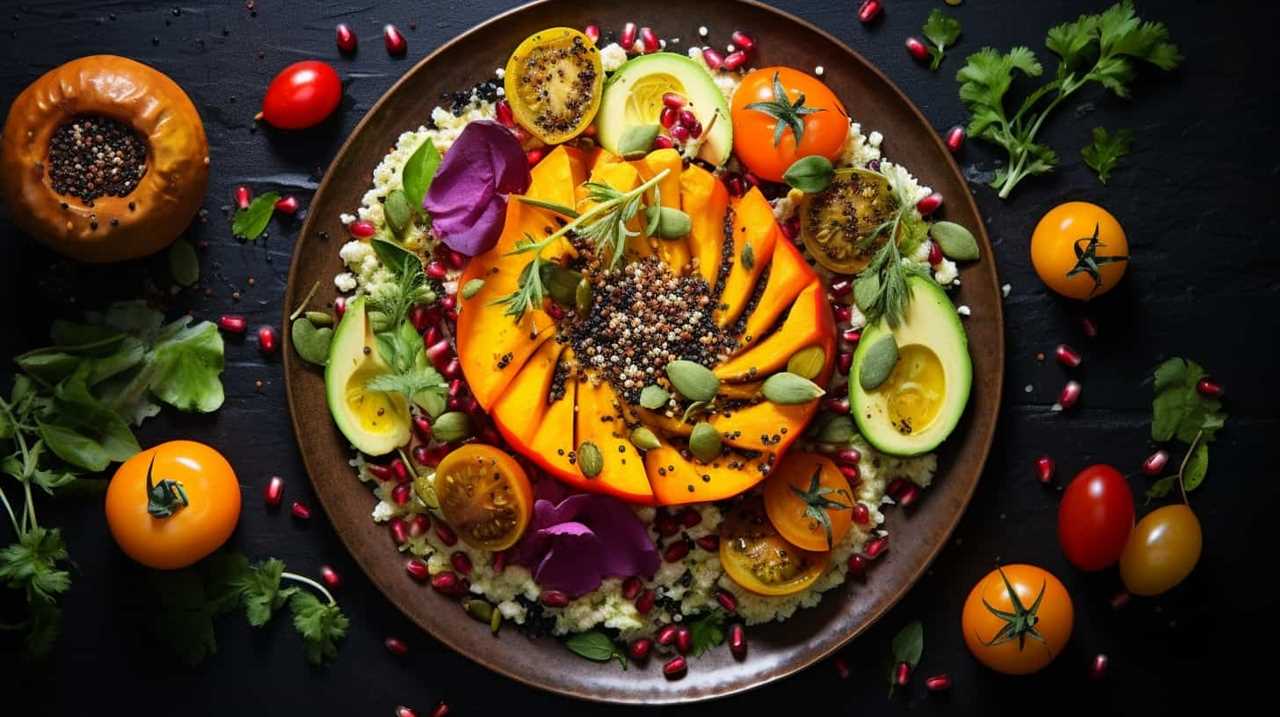
Here are three ways these power seeds can benefit our skeletal system:
- Calcium and magnesium: Chia seeds are an excellent source of calcium and magnesium, which are crucial for maintaining strong bones and preventing bone loss. Incorporating chia seeds into our diet can help ensure we meet our daily calcium and magnesium requirements.
- Omega-3 fatty acids: Flaxseeds are rich in omega-3 fatty acids, known for their anti-inflammatory properties. These healthy fats can help reduce joint pain and inflammation, making them beneficial for individuals with conditions such as arthritis.
- Vitamin K: Sesame seeds are packed with vitamin K, a nutrient essential for bone health. Vitamin K helps regulate calcium levels in the body and promotes the formation of strong and dense bones.
Incorporating these tiny power seeds into our diet, along with regular exercise routines, can contribute to improved bone and joint strength naturally.
Skin Health Enhancer
As we continue exploring the benefits of these power seeds, incorporating them into our diet can also enhance the health and appearance of our skin. These tiny seeds are packed with nutrients that promote skin hydration and have anti-aging effects.
Power seeds such as chia seeds and flaxseeds are rich in omega-3 fatty acids, which help to maintain skin moisture and elasticity. These fatty acids also have anti-inflammatory properties that can reduce redness and irritation, making the skin look smoother and more radiant.
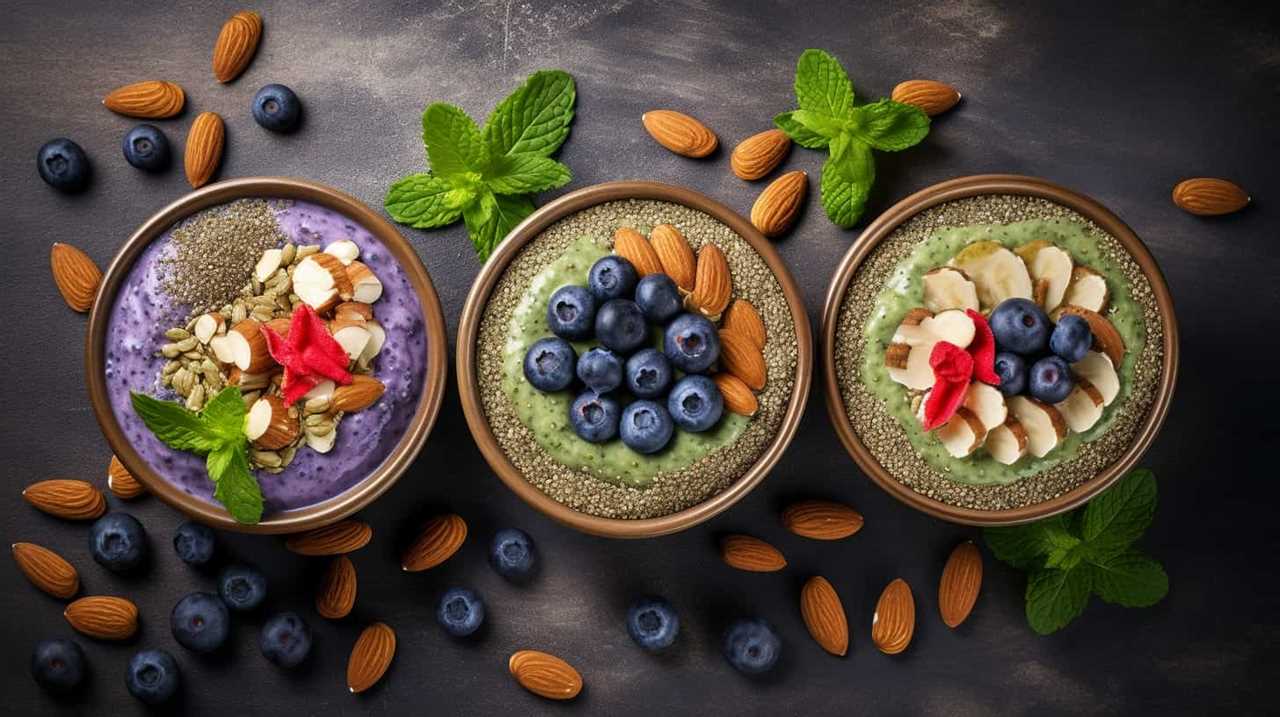
Additionally, power seeds are a great source of antioxidants, including vitamins A, C, and E, as well as minerals like zinc and selenium. These antioxidants help to protect the skin from damage caused by free radicals, which can contribute to premature aging and wrinkles.
Incorporating power seeds into our diet not only nourishes our bodies from the inside out but also supports healthy skin. So go ahead and sprinkle some power seeds on your salads, smoothies, or yogurt to reap the skin-enhancing benefits they offer.
Mental Clarity and Focus
Continuing our exploration of the benefits of power seeds, incorporating them into our diet can also improve mental clarity and focus, as they contain nutrients that support brain health. Here are three ways power seeds can boost your cognitive function and increase productivity:
- Omega-3 fatty acids: Power seeds like flaxseeds and chia seeds are rich in omega-3 fatty acids, which are essential for brain health. These fatty acids help improve memory, enhance learning abilities, and promote overall cognitive function.
- Antioxidants: Power seeds, such as pumpkin seeds and sunflower seeds, are packed with antioxidants. These compounds protect the brain from oxidative stress and inflammation, reducing the risk of cognitive decline and improving mental clarity.
- Nutrient density: Power seeds are nutrient-dense, containing essential vitamins and minerals like vitamin E, B vitamins, magnesium, and zinc. These nutrients play a crucial role in supporting brain function, enhancing focus, and increasing productivity.
Overall Well-being Promotion
Incorporating power seeds into our diet promotes overall well-being by providing a wide range of essential nutrients. These tiny seeds are packed with vitamins, minerals, and antioxidants that support our body’s functions and help us maintain optimal health.

Additionally, power seeds contribute to hydration and exercise by providing a good source of energy and replenishing electrolytes. Whether added to smoothies, sprinkled on top of salads, or used in baking, power seeds offer a convenient and versatile way to boost our nutrient intake.
Furthermore, power seeds aid in stress management and relaxation. They contain compounds such as magnesium and omega-3 fatty acids, which have been shown to reduce stress and promote a sense of calm.
Frequently Asked Questions
How Did the Ancient Mayans and Aztecs Incorporate Power Seeds Into Their Diets?
The ancient Mayans and Aztecs incorporated power seeds into their diets by using traditional recipes. They recognized the health benefits of these tiny seeds and integrated them into their meals for improved nutrition and overall well-being.
Can Power Seeds Help With Weight Loss and Management?
Yes, power seeds can help with weight loss and management. They are like tiny powerhouses, providing essential nutrients and fiber that promote satiety. Incorporating power seeds into our diet can support our weight loss goals.
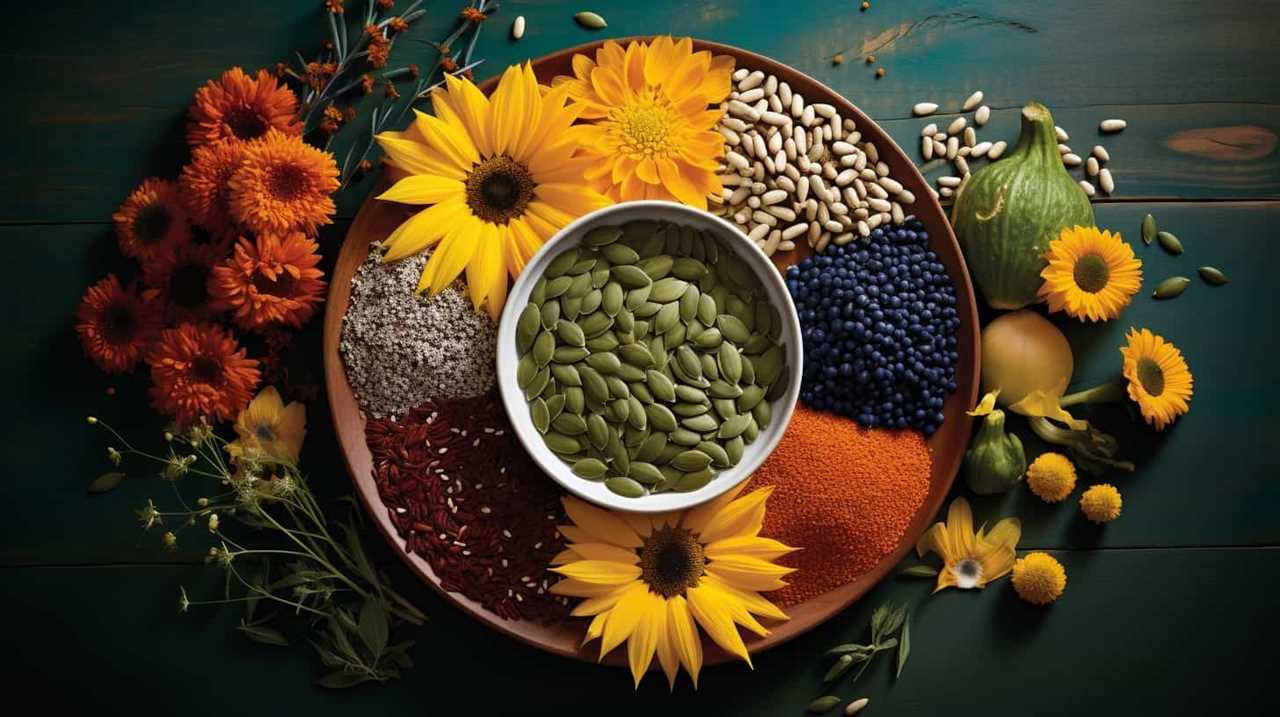
What Are Some Ways Power Seeds Can Support Digestive Health?
Power seeds, like chia, flax, and hemp, offer gut health benefits due to their high fiber and omega-3 content. These seed varieties support digestion by promoting regularity, reducing inflammation, and providing nourishment for beneficial gut bacteria.
Are There Any Specific Power Seeds That Are Particularly Beneficial for Heart Health?
Power seeds like flaxseeds, chia seeds, and hemp seeds have been shown to have beneficial effects on heart health. They can help reduce blood pressure, lower cholesterol, and decrease inflammation, all of which support a healthy heart.
How Can Power Seeds Contribute to Overall Mental Clarity and Focus?
Improving cognitive function and boosting productivity, power seeds are like tiny superheroes for our minds. They enhance mental clarity and focus, helping us perform at our best and conquer any mental challenges that come our way.
Conclusion
Who would have thought that these tiny power seeds could hold such ancient health secrets?
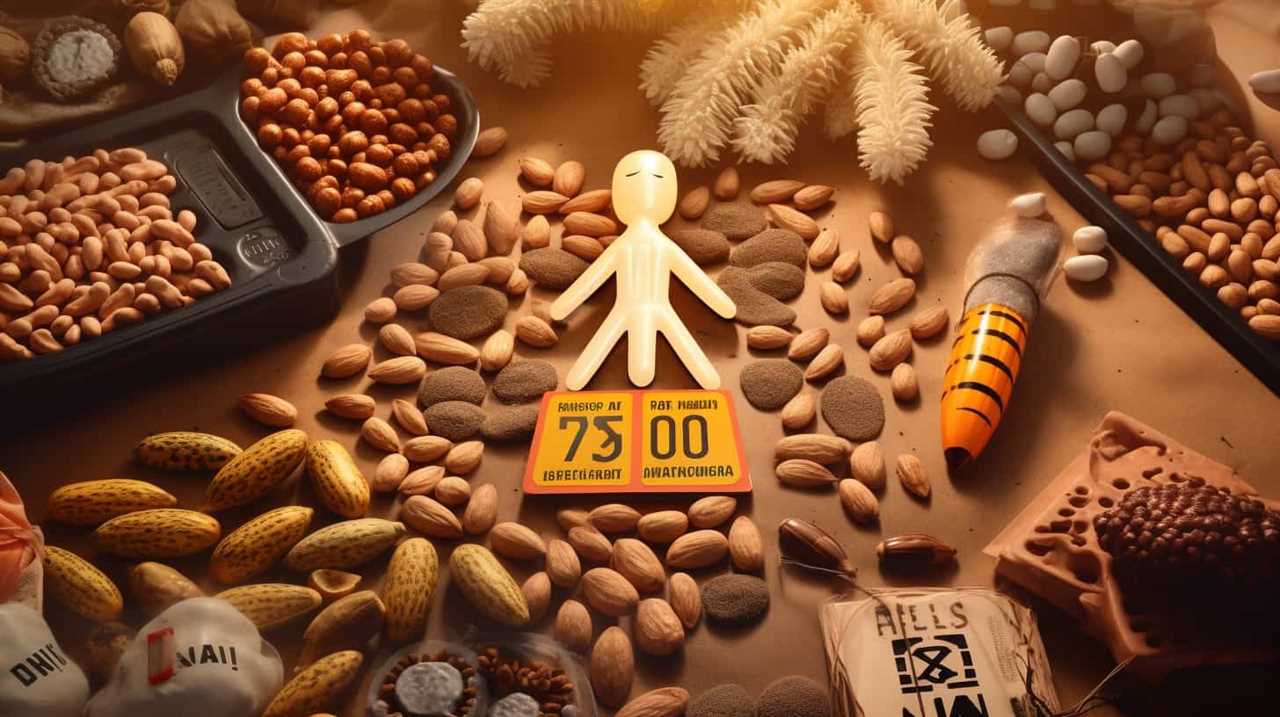
From boosting energy and endurance to promoting overall well-being, it’s clear that the Mayans and Aztecs were onto something.
With their nutrient powerhouse properties, bone and joint strengthening abilities, and even their skin-enhancing effects, these tiny seeds are truly a hidden gem.
So next time you’re looking to improve your health, don’t underestimate the power of these ancient treasures.



